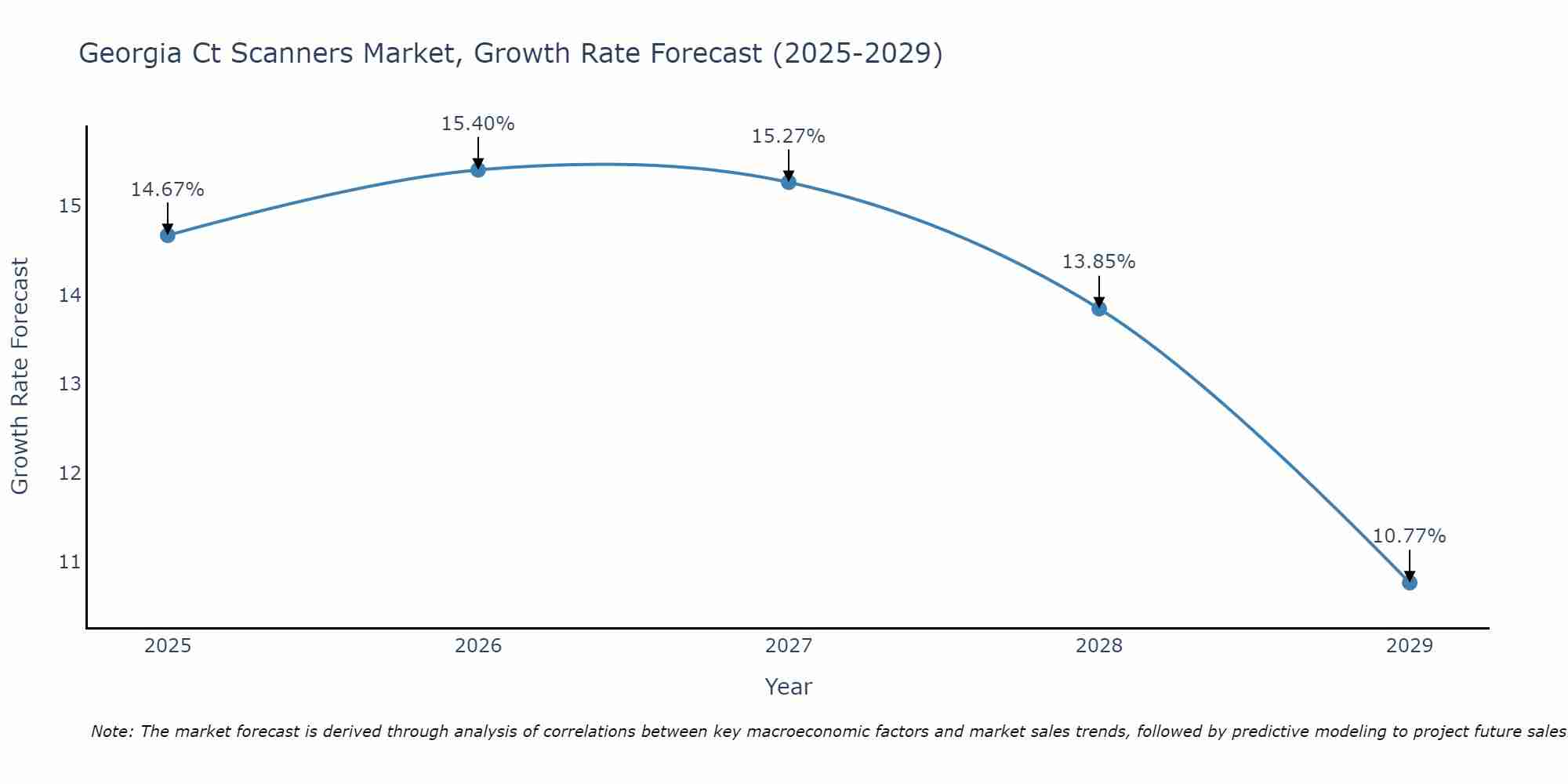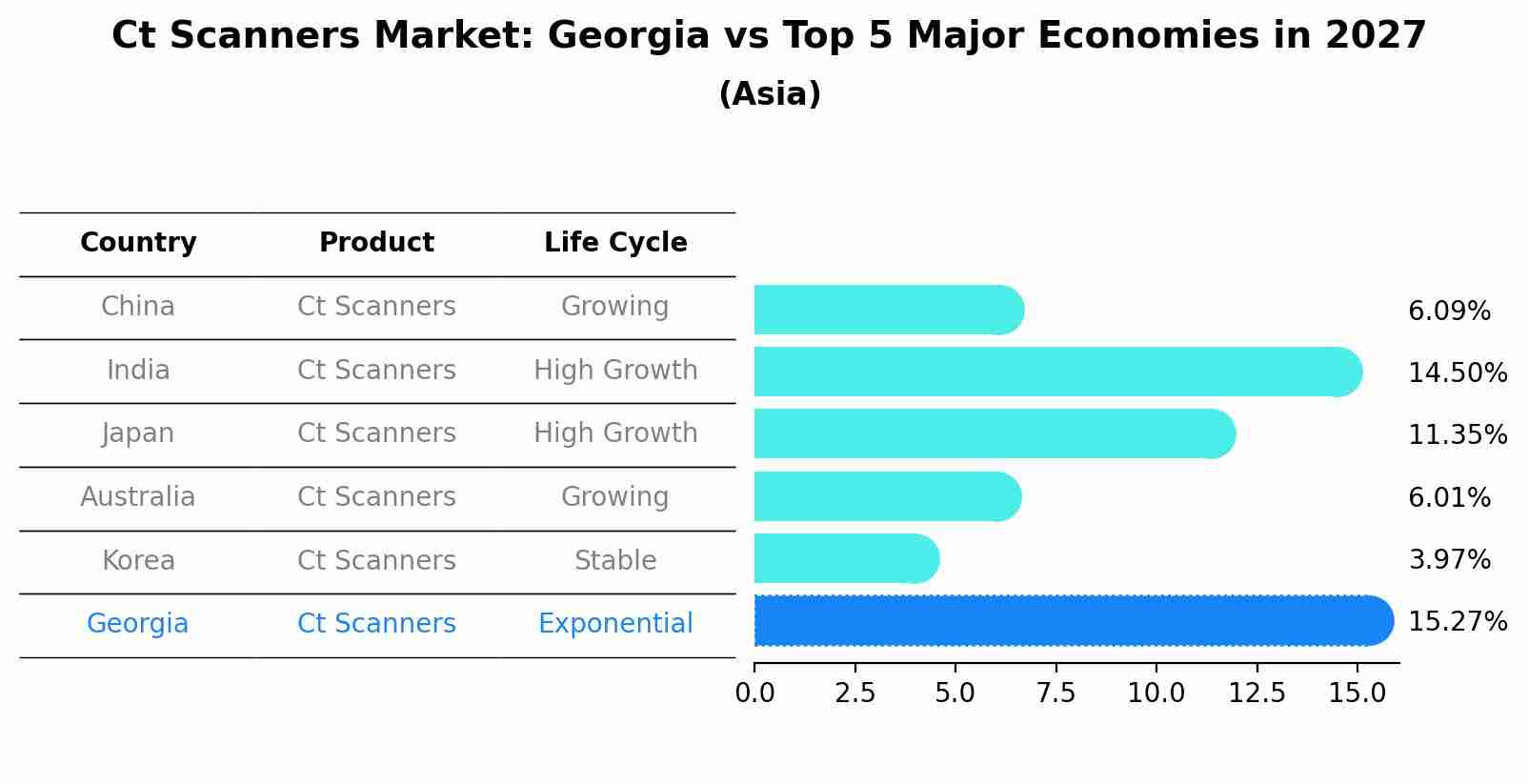Georgia Ct Scanners Market (2025-2031) Outlook | Trends, Analysis, Companies, Value, Revenue, Industry, Share, Forecast, Size & Growth
| Product Code: ETC362820 | Publication Date: Aug 2022 | Updated Date: Aug 2025 | Product Type: Market Research Report | |
| Publisher: 6Wresearch | Author: Sumit Sagar | No. of Pages: 75 | No. of Figures: 35 | No. of Tables: 20 |
Georgia Ct Scanners Market Size Growth Rate
The Georgia Ct Scanners Market is projected to witness mixed growth rate patterns during 2025 to 2029. Growth accelerates to 15.40% in 2026, following an initial rate of 14.67%, before easing to 10.77% at the end of the period.

Ct Scanners Market: Georgia vs Top 5 Major Economies in 2027 (Asia)
The Ct Scanners market in Georgia is projected to grow at a exponential growth rate of 15.27% by 2027, within the Asia region led by China, along with other countries like India, Japan, Australia and South Korea, collectively shaping a dynamic and evolving market environment driven by innovation and increasing adoption of emerging technologies.

Georgia Ct Scanners Market Synopsis
The Georgia CT scanners market is experiencing steady growth driven by factors such as technological advancements, increasing prevalence of chronic diseases, and a growing elderly population in the state. Hospitals, diagnostic imaging centers, and ambulatory surgical centers are the primary end-users of CT scanners in Georgia. The market is characterized by the presence of major players like GE Healthcare, Siemens Healthineers, and Philips Healthcare, alongside several smaller regional players. Providers in Georgia are increasingly investing in advanced CT scanner systems to improve diagnostic accuracy and patient outcomes. Additionally, there is a growing trend towards the adoption of mobile and portable CT scanners to enhance patient convenience and expand imaging services to remote areas. Overall, the Georgia CT scanners market is poised for continued growth and innovation in the coming years.
Georgia Ct Scanners Market Trends
The Georgia CT scanners market is experiencing several key trends. One prominent trend is the increasing adoption of advanced CT technologies, such as spectral CT and dual-energy CT, which offer improved image quality and diagnostic accuracy. Another trend is the rising demand for portable and compact CT scanners, especially in smaller healthcare facilities and mobile imaging units. Additionally, there is a growing focus on value-based care and the need for cost-effective imaging solutions, driving the development of more affordable CT scanner options. Integration of artificial intelligence and machine learning algorithms into CT scanners for automated image analysis and workflow optimization is also a notable trend in the Georgia market. Overall, these trends are shaping the landscape of CT scanners in Georgia towards more advanced, portable, cost-effective, and AI-driven solutions.
Georgia Ct Scanners Market Challenges
In the Georgia CT scanners market, some of the key challenges faced include intense competition among players offering similar products and technologies, pricing pressures due to budget constraints in healthcare facilities, and regulatory challenges related to compliance and approval processes. Additionally, the rapid pace of technological advancements in CT scanning equipment requires companies to continuously innovate and upgrade their products to stay competitive. Moreover, the COVID-19 pandemic has disrupted supply chains and delayed equipment installations, impacting market growth. Companies operating in the Georgia CT scanners market need to navigate these challenges by differentiating their products, providing value-added services, and adapting to changing market dynamics to sustain growth and profitability.
Georgia Ct Scanners Market Investment Opportunities
The Georgia CT Scanners market presents several investment opportunities for growth and expansion. With the increasing prevalence of chronic diseases and the rising demand for advanced diagnostic imaging services, there is a growing need for CT scanners in the healthcare sector in Georgia. Investing in innovative CT scanner technologies that offer superior imaging quality, faster scan times, and lower radiation doses could be a lucrative opportunity. Additionally, focusing on providing mobile or portable CT scanner solutions to reach underserved rural areas could also be a strategic investment. Collaborating with healthcare facilities, hospitals, and imaging centers to offer leasing or rental services for CT scanners could further tap into the market potential in Georgia. Overall, the Georgia CT Scanners market offers a promising landscape for investors looking to capitalize on the growing demand for advanced medical imaging technology in the region.
Jordan Agar Market Government Policies
The government policies related to the Georgia CT Scanners Market primarily focus on ensuring patient safety, quality of care, and regulatory compliance. The Georgia Department of Community Health oversees the licensing and certification of healthcare facilities and medical equipment, including CT scanners, to ensure they meet state standards. Additionally, the state`s insurance regulations impact reimbursement rates for CT scans, influencing healthcare providers` purchasing decisions. Federal regulations such as the Affordable Care Act also play a role in shaping the market by emphasizing cost-effectiveness and quality outcomes. Overall, government policies in Georgia aim to promote access to high-quality healthcare services while maintaining regulatory standards and controlling costs in the CT scanners market.
Georgia Ct Scanners Market Future Outlook
The Georgia CT scanners market is poised for steady growth in the coming years, driven by factors such as increasing prevalence of chronic diseases, rising geriatric population, and advancements in technology. The demand for CT scanners in Georgia is expected to rise as healthcare facilities in the state strive to enhance diagnostic capabilities and improve patient outcomes. Additionally, the ongoing trend towards early detection and prevention of diseases is likely to fuel the adoption of CT scanners. With the growing focus on personalized medicine and precision diagnostics, the Georgia CT scanners market is forecasted to experience a gradual expansion, presenting opportunities for market players to innovate and introduce more advanced imaging solutions tailored to meet the evolving needs of healthcare providers and patients in the region.
Key Highlights of the Report:
- Georgia Ct Scanners Market Outlook
- Market Size of Georgia Ct Scanners Market, 2024
- Forecast of Georgia Ct Scanners Market, 2031
- Historical Data and Forecast of Georgia Ct Scanners Revenues & Volume for the Period 2021 - 2031
- Georgia Ct Scanners Market Trend Evolution
- Georgia Ct Scanners Market Drivers and Challenges
- Georgia Ct Scanners Price Trends
- Georgia Ct Scanners Porter's Five Forces
- Georgia Ct Scanners Industry Life Cycle
- Historical Data and Forecast of Georgia Ct Scanners Market Revenues & Volume By Type for the Period 2021 - 2031
- Historical Data and Forecast of Georgia Ct Scanners Market Revenues & Volume By Stationary CT scanners for the Period 2021 - 2031
- Historical Data and Forecast of Georgia Ct Scanners Market Revenues & Volume By Portable CT scanners for the Period 2021 - 2031
- Historical Data and Forecast of Georgia Ct Scanners Market Revenues & Volume By Device Architecture for the Period 2021 - 2031
- Historical Data and Forecast of Georgia Ct Scanners Market Revenues & Volume By C-arm CT Scanners for the Period 2021 - 2031
- Historical Data and Forecast of Georgia Ct Scanners Market Revenues & Volume By O-arm CT Scanners for the Period 2021 - 2031
- Historical Data and Forecast of Georgia Ct Scanners Market Revenues & Volume By Technology for the Period 2021 - 2031
- Historical Data and Forecast of Georgia Ct Scanners Market Revenues & Volume By High-slice CT for the Period 2021 - 2031
- Historical Data and Forecast of Georgia Ct Scanners Market Revenues & Volume By Mid-slice CT for the Period 2021 - 2031
- Historical Data and Forecast of Georgia Ct Scanners Market Revenues & Volume By Low-slice CT for the Period 2021 - 2031
- Historical Data and Forecast of Georgia Ct Scanners Market Revenues & Volume By Cone-beam CT for the Period 2021 - 2031
- Historical Data and Forecast of Georgia Ct Scanners Market Revenues & Volume By Application for the Period 2021 - 2031
- Historical Data and Forecast of Georgia Ct Scanners Market Revenues & Volume By Human Application for the Period 2021 - 2031
- Historical Data and Forecast of Georgia Ct Scanners Market Revenues & Volume By Diagnostic Applications for the Period 2021 - 2031
- Historical Data and Forecast of Georgia Ct Scanners Market Revenues & Volume By Cardiology Applications for the Period 2021 - 2031
- Historical Data and Forecast of Georgia Ct Scanners Market Revenues & Volume By Oncology Applications for the Period 2021 - 2031
- Historical Data and Forecast of Georgia Ct Scanners Market Revenues & Volume By Neurology Applications for the Period 2021 - 2031
- Historical Data and Forecast of Georgia Ct Scanners Market Revenues & Volume By Intraoperative Applications for the Period 2021 - 2031
- Historical Data and Forecast of Georgia Ct Scanners Market Revenues & Volume By Veterinary Application for the Period 2021 - 2031
- Historical Data and Forecast of Georgia Ct Scanners Market Revenues & Volume By Research Application for the Period 2021 - 2031
- Georgia Ct Scanners Import Export Trade Statistics
- Market Opportunity Assessment By Type
- Market Opportunity Assessment By Device Architecture
- Market Opportunity Assessment By Technology
- Market Opportunity Assessment By Application
- Georgia Ct Scanners Top Companies Market Share
- Georgia Ct Scanners Competitive Benchmarking By Technical and Operational Parameters
- Georgia Ct Scanners Company Profiles
- Georgia Ct Scanners Key Strategic Recommendations
Frequently Asked Questions About the Market Study (FAQs):
- Single User License$ 1,995
- Department License$ 2,400
- Site License$ 3,120
- Global License$ 3,795
Search
Thought Leadership and Analyst Meet
Our Clients
Related Reports
- Afghanistan Apparel Market (2026-2032) | Growth, Outlook, Industry, Segmentation, Forecast, Size, Companies, Trends, Value, Share, Analysis & Revenue
- Canada Oil and Gas Market (2026-2032) | Share, Segmentation, Value, Industry, Trends, Forecast, Analysis, Size & Revenue, Growth, Competitive Landscape, Outlook, Companies
- Germany Breakfast Food Market (2026-2032) | Industry, Share, Growth, Size, Companies, Value, Analysis, Revenue, Trends, Forecast & Outlook
- Australia Briquette Market (2025-2031) | Growth, Size, Revenue, Forecast, Analysis, Trends, Value, Share, Industry & Companies
- Vietnam System Integrator Market (2025-2031) | Size, Companies, Analysis, Industry, Value, Forecast, Growth, Trends, Revenue & Share
- ASEAN and Thailand Brain Health Supplements Market (2025-2031) | Strategy, Consumer Insights, Analysis, Investment Trends, Opportunities, Growth, Size, Share, Industry, Revenue, Segments, Value, Segmentation, Supply, Forecast, Restraints, Outlook, Competition, Drivers, Trends, Demand, Pricing Analysis, Competitive, Strategic Insights, Companies, Challenges
- ASEAN Bearings Market (2025-2031) | Strategy, Consumer Insights, Analysis, Investment Trends, Opportunities, Growth, Size, Share, Industry, Revenue, Segments, Value, Segmentation, Supply, Forecast, Restraints, Outlook, Competition, Drivers, Trends, Demand, Pricing Analysis, Competitive, Strategic Insights, Companies, Challenges
- Europe Flooring Market (2025-2031) | Outlook, Share, Industry, Trends, Forecast, Companies, Revenue, Size, Analysis, Growth & Value
- Saudi Arabia Manlift Market (2025-2031) | Outlook, Size, Growth, Trends, Companies, Industry, Revenue, Value, Share, Forecast & Analysis
- Uganda Excavator, Crane, and Wheel Loaders Market (2025-2031) | Strategy, Consumer Insights, Analysis, Investment Trends, Opportunities, Growth, Size, Share, Industry, Revenue, Segments, Value, Segmentation, Supply, Forecast, Restraints, Outlook, Competition, Drivers, Trends, Demand, Pricing Analysis, Competitive, Strategic Insights, Companies, Challenges
Industry Events and Analyst Meet
Whitepaper
- Middle East & Africa Commercial Security Market Click here to view more.
- Middle East & Africa Fire Safety Systems & Equipment Market Click here to view more.
- GCC Drone Market Click here to view more.
- Middle East Lighting Fixture Market Click here to view more.
- GCC Physical & Perimeter Security Market Click here to view more.
6WResearch In News
- Doha a strategic location for EV manufacturing hub: IPA Qatar
- Demand for luxury TVs surging in the GCC, says Samsung
- Empowering Growth: The Thriving Journey of Bangladesh’s Cable Industry
- Demand for luxury TVs surging in the GCC, says Samsung
- Video call with a traditional healer? Once unthinkable, it’s now common in South Africa
- Intelligent Buildings To Smooth GCC’s Path To Net Zero


















